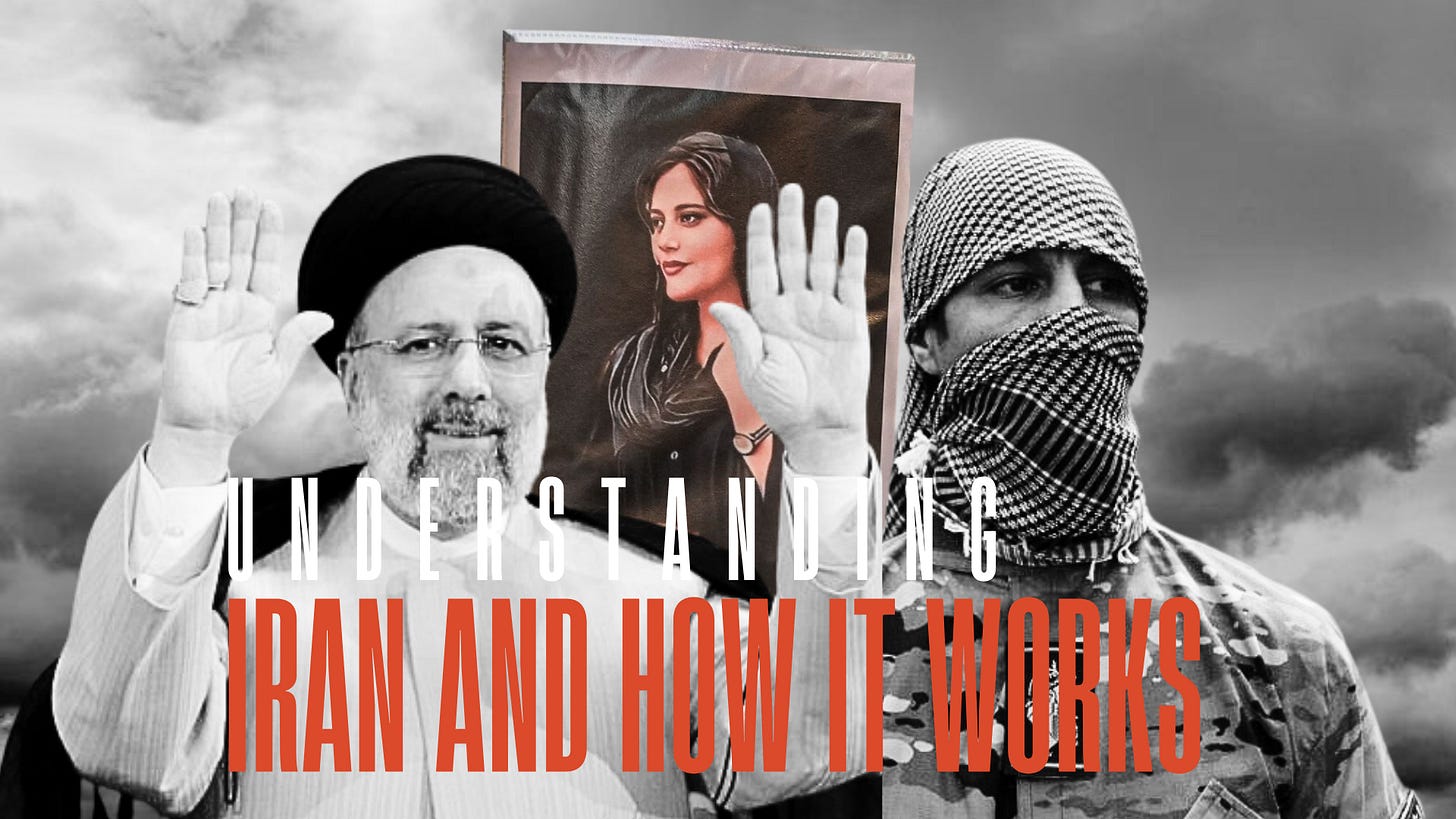The Iranian Revolution of 1979 was the first world event I followed. I was 11/12 and fascinated by the news coverage and the sense that the reporters didn't really expect the regime of the Shah to fall. But fall it did. Before 1979, Iran was the darling of the West, but now it is its implacable enemy, a theocratic state with burgeoning regional power.
My sense is that even the most steadfast of geopolitical watchers are confused about Iran and its structure of governance. Monique Bellamy, a friend of the podcast, recommended two distinguished guests, Jason M. Bronski and Henrik F. Rasmussen, to discuss the intricate political structure of Iran, its recent protests, and the implications of its policies both domestically and regionally. This episode comes at a crucial time following the recent death of Iran's president, which has significant ramifications for the country's political future.
Jason M. Bronski, the Policy Director at United Against a Nuclear Iran, begins by outlining the role and influence of Ayatollah Ali Khamenei, Iran's Supreme Leader since 1989. Khamenei, a pivotal figure in Iran's political and religious hierarchy, wields extensive power; in effect, he is a monarch of the Islamic Republic, overshadowing the position of the president. He holds ultimate authority over Iran's internal and external policies. Bronski emphasises that Khamenei's tenure has been marked by his ability to outmanoeuvre and outlive various U.S. administrations and maintain a firm grip on Iran's strategic direction.
Khamenei's ascent to the role of Supreme Leader was not straightforward. Initially, he was a revolutionary figure imprisoned during the era of the Shah. Following the 1979 Islamic Revolution, Khamenei rapidly rose through the ranks, eventually becoming Iran's president in 1981. His transition to Supreme Leader in 1989, after the death of Ruhollah Khomeini, was facilitated by influential figures like Ali Akbar Hashemi Rafsanjani, despite Khamenei's initial lower clerical rank.
The Iranian government is structured around the Supreme Leader, who is the ultimate decision-maker. The president, often perceived as a chief operating officer, manages day-to-day governmental operations but lacks real authority. This dynamic became evident during the tenure of the late president, whose recent death has further underscored the concentration of power in Khamenei's hands.
The role of the Morality Police and civil liberties, particularly in light of the death of Mahsa Amini, which sparked widespread protests in 2022, was brought into focus. These protests ripped apart civil society in Iran. Massive demonstrations were seen all over the country for months, opposed to the Morality Police and the regime at large. Operating under the interior ministry, they enforce Islamic dress codes and societal norms. However, their authority is backed by the Supreme Leader and other high-ranking officials, highlighting the regime's control over civil liberties.
Bronski notes that while protests have subsided since the peak of the Woman, Life, Freedom movement, the underlying discontent among the Iranian population persists. The demands for an end to the Islamic Republic reflect deep-seated frustrations with corruption, economic mismanagement, and repression. The regime's recent crackdown has quelled the demonstrations temporarily, but the potential for renewed unrest remains high.
Henrik F. Rasmussen, Executive Director at the Institute for Science and International Security, shifts the focus to Iran's regional manoeuvres and military capabilities. Iran's nuclear ambitions, long a point of contention, are a significant concern for Western nations. Despite Iran's claims of pursuing nuclear energy for civilian purposes, evidence suggests a continued effort to develop nuclear weapons capabilities.
Rasmussen explains that Iran's nuclear program has been a source of international tension since the 1980s. The Joint Comprehensive Plan of Action (JCPOA), negotiated in the 2010s, aimed to curb Iran's nuclear activities. However, recent developments indicate Iran's stockpiling of enriched uranium, raising fears of weaponisation. The divergence in approach between the U.S. and European nations on dealing with Iran's nuclear potential continues to complicate the geopolitical landscape.
Our discussion turned to the implacable enmity between Iran and Israel. Historical alliances between the two countries were severed post-1979 with the founding of the Islamic Republic, which has adopted a staunchly anti-Israel stance since. Iran's support for proxy groups like Hezbollah, Hamas, and the Houthis forms part of its "axis of resistance" strategy, aimed at encircling Israel and exerting regional influence.
It's often forgotten that there is instability on Iran's eastern border with Pakistan. Militant groups like Jaysh al-Adl have long posed security threats to both nations. The Iranian Revolutionary Guard Corps (IRGC) has been involved in operations within Pakistani territory, further straining relations between the two nations.
The podcast concludes with a discussion on Iran's growing cooperation with Russia, particularly in the context of the Ukraine conflict. Rasmussen points out that Iran's technological and military support to Russia, including drone technology, has significant implications for regional and global security. This alliance, based on mutual opposition to Western influence, enhances Iran's strategic position but also introduces new challenges for international stability.
Time and demographics seem to be against the Islamic Republic. The recent death of Iran's president and its missile strike on Israel underscore the ongoing challenges faced by the Iranian regime. When I asked Bronski to forecast how long the regime will last, he declined, noting he didn't own a crystal ball. However, it appears the sands of time from Iran's Great Salt Desert are running out for the Islamic Republic. It can only repress its citizens for so long.













